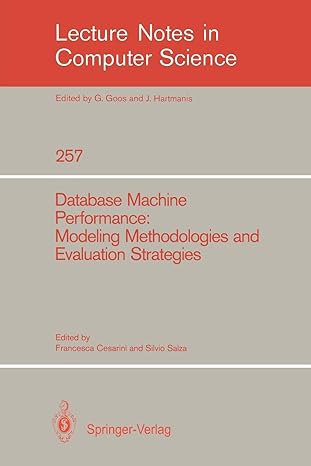Question
Hello, please help with the following No incomplete answers I will rate :). Please Use the program below and do the program in C++ to
Hello, please help with the following No incomplete answers I will rate :).
Please Use the program below and do the program in C++ to develop a lexical analyzer. Use the expression "( sum + 47 ) / total" as the input. If possible, use a programming method to have the program not have to key in the expression.
Thank You. Just submit source code and screenshots, these are the results you should have:
Next token is: 25 Next lexeme is (
Next token is: 11 Next lexeme is sum
Next token is: 21 Next lexeme is +
Next token is: 10 Next lexeme is 47
Next token is: 26 Next lexeme is )
Next token is: 24 Next lexeme is /
Next token is: 11 Next lexeme is total
Next token is: -1 Next lexeme is EOF
PROGRAM:
/* front.c - a lexical analyzer system for simple
arithmetic expressions */
#include
#include
/* Global declarations */
/* Variables */
int charClass;
char lexeme [100];
char nextChar;
int lexLen;
int token;
int nextToken;
FILE *in_fp, *fopen();
/* Function declarations */
void addChar();
void getChar();
void getNonBlank();
int lex();
/* Character classes */
#define LETTER 0
#define DIGIT 1
#define UNKNOWN 99
/* Token codes */
#define INT_LIT 10
#define IDENT 11
#define ASSIGN_OP 20
#define ADD_OP 21
#define SUB_OP 22
#define MULT_OP 23
#define DIV_OP 24
#define LEFT_PAREN 25
#define RIGHT_PAREN 26
/******************************************************/
/* main driver */
main() {
/* Open the input data file and process its contents */
if ((in_fp = fopen("front.in", "r")) == NULL)
printf("ERROR - cannot open front.in ");
else {
getChar();
do {
lex();
} while (nextToken != EOF);
}
}
/*****************************************************/
/* lookup - a function to lookup operators and parentheses
and return the token */
int lookup(char ch) {
switch (ch) {
case '(':
addChar();
nextToken = LEFT_PAREN;
break;
case ')':
addChar();
nextToken = RIGHT_PAREN;
break;
case '+':
addChar();
nextToken = ADD_OP;
break;
case '-':
addChar();
nextToken = SUB_OP;
break;
case '*':
addChar();
nextToken = MULT_OP;
break;
case '/':
addChar();
nextToken = DIV_OP;
break;
default:
addChar();
nextToken = EOF;
break;
}
return nextToken;
}
/*****************************************************/
/* addChar - a function to add nextChar to lexeme */
void addChar() {
if (lexLen <= 98) {
lexeme[lexLen++] = nextChar;
lexeme[lexLen] = 0;
}
else
printf("Error - lexeme is too long ");
}
/*****************************************************/
/* getChar - a function to get the next character of
input and determine its character class */
void getChar() {
if ((nextChar = getc(in_fp)) != EOF) {
if (isalpha(nextChar))
charClass = LETTER;
else if (isdigit(
nextChar))
charClass = DIGIT;
else charClass = UNKNOWN;
}
else
charClass = EOF;
}
/*****************************************************/
/* getNonBlank - a function to call getChar until it
returns a non-
whitespace
character */
void getNonBlank() {
while (isspace(nextChar))
getChar();
}
/
*****************************************************/
/* lex - a simple lexical analyzer for arithmetic
expressions */
int lex() {
lexLen = 0;
getNonBlank();
switch (charClass) {
/* Parse identifiers */
case LETTER:
addChar();
getChar();
while (charClass == LETTER || charClass == DIGIT) {
addChar();
getChar();
}
nextToken = IDENT;
break;
/* Parse integer literals */
case DIGIT:
addChar();
getChar();
while (charClass == DIGIT) {
addChar();
getChar();
}
nextToken = INT_LIT;
break;
/* Parentheses and operators */
case UNKNOWN:
lookup(nextChar);
getChar();
break;
/* EOF */
case EOF:
nextToken = EOF;
lexeme[0] = 'E';
lexeme[1] = 'O';
lexeme[2] = 'F';
lexeme[3] = 0;
break;
} /* End of switch */
printf("Next token is: %d, Next lexeme is %s ",
nextToken, lexeme);
return nextToken;
} /* End of function lex */
Step by Step Solution
There are 3 Steps involved in it
Step: 1

Get Instant Access to Expert-Tailored Solutions
See step-by-step solutions with expert insights and AI powered tools for academic success
Step: 2

Step: 3

Ace Your Homework with AI
Get the answers you need in no time with our AI-driven, step-by-step assistance
Get Started


